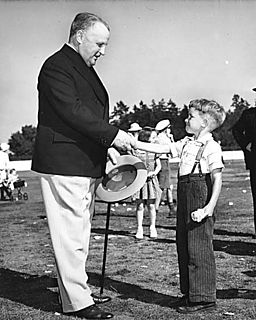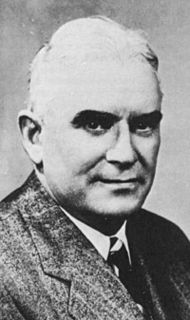The British Columbia Social Constructive Party (also known as the Social Constructives and the BC Reconstructive Party) was formed in 1936 by a breakaway from the British Columbia Co-operative Commonwealth Federation after Robert Connell was expelled from the party over doctrinal differences. Connell had been leader of the CCF until his expulsion. Three other MLAs of the seven-person CCF caucus, Jack Price, R. B. Swailes, and Ernest Bakewell, left the party and joined Connell to form the Social Constructives. The four member caucus, having one more MLA than the CCF, was large enough to allow Connell to remain Leader of the Opposition in the British Columbia Legislative Assembly. Other defectors included Victor Midgely, former leader of the One Big Union, and Bill Pritchard, editor and owner of the BC CCF's newspaper, The Commonwealth. [1] The party worked closely with Rolf Wallgren Bruhn an independent MLA who had formerly been a Conservative. Bruhn helped write the new party's platform and conducted a speaking tour with Connell during the 1937 general election but declined to join the party and stood for re-election as an independent [2] though with the Constructives' endorsement. [3]
Connell was expelled for publicly rejecting the party platform adopted by the BC CCF at its 1936 convention as too radical for calling for the socialization of banking and credit.
The new party ran on a moderate left of centre program standing between the governing Liberal Party of British Columbia and the CCF. The new party lacked the organizational strength of either the CCF or the Liberals and was unable to field candidates in even one-third of the province's electoral districts. The party also refused to hold nominating conventions for candidates in order to prevent groups from taking over the party. Instead, individuals were invited to stand as candidates and then appointed. [1] In the context of the Great Depression, the party's platform of moderate reformism proved unable to distinguish itself from a Liberal Party that was leaning left and using the slogan of "socialized capitalism". [1]
The "Social Constructives" stood 14 candidates (out of a possible 48) in the 1937 general election but failed to win any seats, although their endorsee Bruhn was re-elected as an Independent; Bruhn later rejoined the Conservatives. The Social Constructives received 8,086 votes to the CCF's 119,400. [1] Disappointed with the results, Connell came to the conclusion that change was not possible through a third party but only through working within mainstream parties.
The British Columbia Liberal Party is a centre-right provincial political party in British Columbia, Canada. The party currently forms the Official Opposition. The leader of the Liberal Party, and Leader of the Official Opposition of British Columbia, is Andrew Wilkinson.
The New Democratic Party of British Columbia is a social-democratic provincial political party in British Columbia, Canada, which currently governs the province. It previously governed from 1972 to 1975 and from 1991 to 2001. Following a hung parliament as a result of the 2017 election and the BC Liberal government's failure to win a confidence vote in the legislature, the BC NDP secured a confidence and supply agreement with the BC Green Party to form a minority government. The BC NDP is the British Columbia provincial arm of the federal New Democratic Party (NDP).
The Progressive Party of Canada was a federal-level political party in Canada in the 1920s until 1930. It was linked with the provincial United Farmers parties in several provinces, and it spawned the Progressive Party of Saskatchewan, and the Progressive Party of Manitoba, which formed the government of that province. The Progressive Party was part of the farmers' political movement that included federal and provincial Progressive and United Farmers' parties.

The British Columbia Social Credit Party, whose members are known as Socreds, was the governing provincial political party of British Columbia, Canada, for all but three years between the 1952 provincial election and the 1991 election. For four decades, the party dominated the British Columbian political scene, with the only break occurring between the 1972 and 1975 elections when the British Columbia New Democratic Party governed.

Thomas Dufferin ("Duff") Pattullo was the 22nd Premier of British Columbia, Canada from 1933 to 1941. The Pattullo Bridge is named in his honour as well as Prince Rupert's Pattullo Park, Mount Pattullo, and the Pattullo Range in North Tweedsmuir Provincial Park, and the Pattullo Glaciers in that range.
There have been various groups in Canada that have nominated candidates under the label Labour Party or Independent Labour Party or other variations from the 1870s until the 1960s. These were usually local or provincial groups using the Labour Party or Independent Labour Party name, backed by local labour councils or individual trade unions. There was an attempt to create a national Canadian Labour Party in the late 1910s and in the 1920s, but these were partly successful. The Communist Party of Canada, formed in 1921/22, fulfilled some of labour's political yearnings from coast to coast, and then the Co-operative Commonwealth Federation - Worker Farmer Socialist" was formed in 1932. With organic ties to the organized labour movement, this was a labour party by definition.
The British Columbia Conservative Party, or simply the BC Conservatives, is an active provincial political party in British Columbia, Canada. In the early half of the 20th century, the Conservatives competed with the British Columbia Liberal Party for power in the province. Since the 1950s however, the party has had only a minor presence, not having elected a member of the Legislative Assembly in a general election since 1975. The last sitting MLA for the Conservatives was John van Dongen, who briefly crossed the floor to the party in 2012 before leaving to sit as an independent.

The Alberta New Democratic Party, commonly shortened to Alberta's NDP, is a social-democratic political party in Alberta, Canada. It is the provincial Alberta affiliate of the federal New Democratic Party of Canada, and the successor to the Alberta section of the Co-operative Commonwealth Federation and the even earlier Alberta wing of the Canadian Labour Party and the United Farmers of Alberta. From the mid-1980s to 2004, the party abbreviated its name as the "New Democrats" (ND).

The 1952 British Columbia general election was the 23rd general election in the Canadian province of British Columbia. It was held to elect members of the Legislative Assembly of British Columbia, alongside a plebiscite on daylight saving time and liquor. The election was called on April 10, 1952, and held on June 12, 1952. The new legislature met for the first time on February 3, 1953. It was the first general election to use a preferential ballot, a short-lived phenomenon in BC. The presence of multi-member districts such as Victoria City with 3 MLAs in conjunction with the Alternative voting system called for an innovation where the district's slate of candidates was split into three "ballots," each with one candidate from each party.
The leader of the Opposition in British Columbia is the MLA in the Legislative Assembly of British Columbia who leads the political party recognized as the Official Opposition. This position generally goes to the leader of the largest party in the Legislative Assembly that is not in government.
The Politics of British Columbia involves not only the governance of British Columbia, Canada, and the various political factions that have held or vied for legislative power, but also a number of experiments or attempts at political and electoral reform.
The Socialist Party of British Columbia (SPBC) was a provincial political party in British Columbia, Canada, from 1901 to 1905. In 1903, the SPBC won seats in the Legislative Assembly of British Columbia. The SPC never won seats in the House of Commons of Canada.
Robert Connell (1871–1957) was a Scottish-Canadian Anglican priest and politician in British Columbia. He was the first leader of the Co-operative Commonwealth Federation party in British Columbia.
Rolf Wallgren Bruhn was a Swedish-born farmer, lumberman and political figure in British Columbia. He represented Salmon Arm in the Legislative Assembly of British Columbia from 1924 to 1942 as a Conservative.
The 18th Legislative Assembly of British Columbia sat from 1934 to 1937. The members were elected in the British Columbia general election held in November 1933. The Liberal Party, led by Thomas Dufferin Pattullo, formed the government. The Co-operative Commonwealth Federation (CCF) formed the official opposition.
The 19th Legislative Assembly of British Columbia sat from 1937 to 1941. The members were elected in the British Columbia general election held in June 1937. The Liberal Party, led by Thomas Dufferin Pattullo, formed the government. The Conservative Party formed the official opposition.
George Faulds Stirling was an English-born educator, rancher and political figure in British Columbia. He represented Salmon Arm in the Legislative Assembly of British Columbia from 1942 to 1945 as a Co-operative Commonwealth Federation (CCF) member.